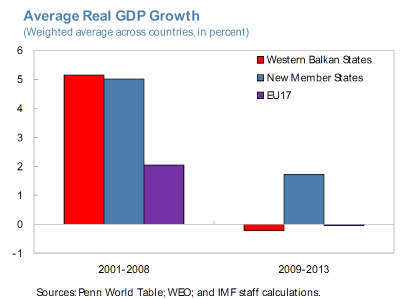Press Release: New IMF Report Urges Balkan Countries to Complete Reform Process
Western Balkan countries have attained major economic achievements in the last 15 years, but need to complete the transition to market economies to lay the ground for future sustainable growth. A new International Monetary Fund (IMF) report released today, “The Western Balkans: 15 Years of Economic Transition,” concludes that Albania, Bosnia and Herzegovina, Croatia, Kosovo, the Former Yugoslav Republic of Macedonia, Montenegro and Serbia are lagging behind other former communist countries that went through comparable transitions.
Reviewing economic developments since the end of the 1990s conflicts, a team of IMF experts chronicles how the Western Balkans first embarked in a full-fledged transformation. They opened up to global trade, became export-oriented, expanded the role of the private sector, and developed banking systems. “Many of these countries are unrecognizable compared to where they stood at the turn of the century,” the report argues.
But the transformation lost momentum in the mid-2000s, due in part to reform fatigue and encroaching vested interests. For some time, though, ample liquidity and unsustainable capital inflows provided temporary fixes. Then the 2008 financial crisis hit hard, and exposed many structural vulnerabilities. Today, six years after the crisis, it is clear that the West Balkans lag behind other Emerging Europe states in income growth and closing the gap with the Advanced European Union countries.
“A key contribution of this report is to underscore the incomplete reform process in the region. We should be worried about this, as without further reforms the lackluster growth of recent years could become the norm, imperiling the convergence of living standards towards the levels of Advanced EU economies, and denying employment opportunities to many in the region,” David Lipton, the IMF’s First Deputy Managing Director, writes in the report’s Foreword.
As shown in the graphic below, between 2001 and 2008, the Western Balkans had an average GDP growth of just over 5 percent, slightly outperforming the group referred to in the report as “New Member States” (NMS, formed by Bulgaria, Czech Republic, Estonia, Hungary, Lithuania, Latvia, Poland, Romania, Slovak Republic and Slovenia, countries that joined the EU during the 2004 and 2007 enlargement). The post-crisis years show the difference: while the NMS group had an average growth of around 2 percent, the Balkans had a lackluster performance, with a slightly negative result. While the external environment has been weak, “it is the incomplete reform process that is holding back convergence to income levels of richer EU economies,” the report argues.

What then needs to be done? The two main recommendations are to safeguard macroeconomic stability and embark on deep structural reforms. Countries should tackle fiscal deficits and reduce public debt; invest in tradable sectors to boost exports and reduce trade and current account deficits; confront the problem of non-performing loans that clog financial systems, so banks can lend anew to the private sector; improve competitiveness; privatize state-owned enterprises that still drain public resources; and improve labor markets.
“I remain confident that the region will rise to the challenge, as happened time and again in the past. A new wave of elected leaders, and an increasingly vibrant civil society, are ready for a second reform wave,” adds Mr. Lipton, who first advised transition countries in the early 1990s.
The new report will be discussed in a high-level conference in Vienna on March 10, gathering senior officials from the seven countries and experts from several international organizations to discuss the Western Balkans policy challenges and solutions going forward. The event is co-hosted by the Austrian National Bank and the Joint Vienna Institute. For more information visit the conference webpage.
Legal Disclaimer:
EIN Presswire provides this news content "as is" without warranty of any kind. We do not accept any responsibility or liability for the accuracy, content, images, videos, licenses, completeness, legality, or reliability of the information contained in this article. If you have any complaints or copyright issues related to this article, kindly contact the author above.
